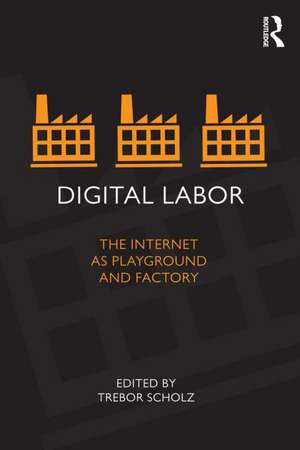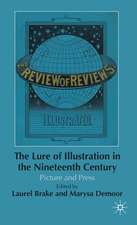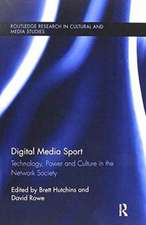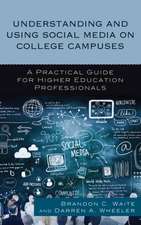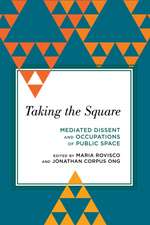Digital Labor: The Internet as Playground and Factory
Editat de Trebor Scholzen Limba Engleză Paperback – 19 sep 2012
This unique collection of essays provides a wide-ranging account of the dark side of the Internet. It claims that the divide between leisure time and work has vanished so that every aspect of life drives the digital economy. The book reveals the anatomy of playbor (play/labor), the lure of exploitation and the potential for empowerment. Ultimately, the 14 thought-provoking chapters in this volume ask how users can politicize their troubled complicity, create public alternatives to the centralized social web, and thrive online.
Contributors: Mark Andrejevic, Ayhan Aytes, Michel Bauwens, Jonathan Beller, Patricia Ticineto Clough, Sean Cubitt, Jodi Dean, Abigail De Kosnik, Julian Dibbell, Christian Fuchs, Lisa Nakamura, Andrew Ross, Ned Rossiter, Trebor Scholz, Tizania Terranova, McKenzie Wark, and Soenke Zehle
| Toate formatele și edițiile | Preț | Express |
|---|---|---|
| Paperback (1) | 304.37 lei 43-57 zile | |
| Taylor & Francis – 19 sep 2012 | 304.37 lei 43-57 zile | |
| Hardback (1) | 1116.38 lei 43-57 zile | |
| Taylor & Francis – 19 sep 2012 | 1116.38 lei 43-57 zile |
Preț: 304.37 lei
Nou
Puncte Express: 457
Preț estimativ în valută:
58.24€ • 60.96$ • 48.48£
58.24€ • 60.96$ • 48.48£
Carte tipărită la comandă
Livrare economică 31 martie-14 aprilie
Preluare comenzi: 021 569.72.76
Specificații
ISBN-13: 9780415896955
ISBN-10: 0415896959
Pagini: 272
Ilustrații: 3 Tables, black and white; 15 Halftones, black and white
Dimensiuni: 152 x 229 x 17 mm
Greutate: 0.5 kg
Ediția:1
Editura: Taylor & Francis
Colecția Routledge
Locul publicării:Oxford, United Kingdom
ISBN-10: 0415896959
Pagini: 272
Ilustrații: 3 Tables, black and white; 15 Halftones, black and white
Dimensiuni: 152 x 229 x 17 mm
Greutate: 0.5 kg
Ediția:1
Editura: Taylor & Francis
Colecția Routledge
Locul publicării:Oxford, United Kingdom
Public țintă
Postgraduate and UndergraduateCuprins
Introduction: Trebor Scholz Why Does Digital Labor Matter Now?
I. The Shifting Sites of Labor Markets
1. Andrew Ross On the Digital Labor Question
2. Tiziana Terranova Free Labor
3. Sean Cubitt The Political Economy of Cosmopolis
4. McKenzie Wark Considerations on A Hacker Manifesto
II. Interrogating Modes of Digital Labor
5. Ayhan Aytes Return of The Crowds: Mechanical Turk and Neoliberal States of Exception
6. Abigail De Kosnik Fandom as Free Labor
7. Patricia Clough The Digital, Labor and Measure Beyond Biopolitics
8. Jodi Dean Whatever Blogging
III. The Violence of Participation
9. Mark Andrejevic Estranged Free Labor
10. Jonathan Beller Digitality and The Media of Dispossession
11. Lisa Nakamura Don’t Hate the Player, Hate the Game: The Racialization of Labor in World of Warcraft
IV. Organizing Networks in an Age of Vulnerable Publics
12. Michel Bauwens Thesis on Digital Labor in an Emerging P2P Economy
13. Christian Fuchs Class and Exploitation on the Internet
14. Ned Rossitter and Soenke Zehle Acts of Translation: Organizing Networks as Algorithmic Technologies of the Common
Bibliography
I. The Shifting Sites of Labor Markets
1. Andrew Ross On the Digital Labor Question
2. Tiziana Terranova Free Labor
3. Sean Cubitt The Political Economy of Cosmopolis
4. McKenzie Wark Considerations on A Hacker Manifesto
II. Interrogating Modes of Digital Labor
5. Ayhan Aytes Return of The Crowds: Mechanical Turk and Neoliberal States of Exception
6. Abigail De Kosnik Fandom as Free Labor
7. Patricia Clough The Digital, Labor and Measure Beyond Biopolitics
8. Jodi Dean Whatever Blogging
III. The Violence of Participation
9. Mark Andrejevic Estranged Free Labor
10. Jonathan Beller Digitality and The Media of Dispossession
11. Lisa Nakamura Don’t Hate the Player, Hate the Game: The Racialization of Labor in World of Warcraft
IV. Organizing Networks in an Age of Vulnerable Publics
12. Michel Bauwens Thesis on Digital Labor in an Emerging P2P Economy
13. Christian Fuchs Class and Exploitation on the Internet
14. Ned Rossitter and Soenke Zehle Acts of Translation: Organizing Networks as Algorithmic Technologies of the Common
Bibliography
Notă biografică
Trebor Scholz is Associate Professor of Culture and Media at The New School.
Recenzii
"Almost 20 years since we were promised a new era of creativity, connectivity, and commerce by the rise of the World Wide Web, we are finally able to ask hard questions about how digital ecosystems have affected human capabilities. This book is essential to any effort to make sense of the digital economy and its effects on real people around the world." —Siva Vaidhyanathan, author of The Googlization of Everything—and Why We Should Worry
"Internet business models increasingly rely on the uncompensated and crowd-sourced contributions of individuals. This important book brings together leading thinkers to shine a much needed and critical light on what this practice means for the future of markets, freedom, and individual autonomy." —Laura DeNardis, author of Protocol Politics: The Globalization of Internet Governance
"Almost 20 years since we were promised a new era of creativity, connectivity, and commerce by the rise of the World Wide Web, we are finally able to ask hard questions about how digital ecosystems have affected human capabilities. This book is essential to any effort to make sense of the digital economy and its effects on real people around the world." Siva Vaidhyanathan, author of The Googlization of Everything—and Why We Should Worry
"Internet business models increasingly rely on the uncompensated and crowd-sourced contributions of individuals. This important book brings together leading thinkers to shine a much needed and critical light on what this practice means for the future of markets, freedom, and individual autonomy." Laura DeNardis, author of Protocol Politics: The Globalization of Internet Governance
"Scholz provides a timely collection on digital labor and the conflation of work and play online...The collection has many strengths. It includes works from scholars at varying ranks and foundational works on digital labor (e.g., essays by Tizania Terranova and Lisa Nakamura). It will prove valuable for cultural critique of new media, for both seasoned and novice scholars, and for those interested in social and political implications of social media, user-generated content, and algorithm-enabled Web technologies."
D Shepherd, CHOICE
'Overall, Digital Labour represents an original set of criticisms of the Internet from an overarching Marxist perspective, making the book valuable reading for scholars and students of media studies, cultural studies and the sociology of technology. It offers unique perspectives on the social implications of new media technologies, and addresses points that have been neglected by more mainstream media scholars since the first critiques of interactive media.' Mohammad Kazeroun, European Journal of Communication
"Internet business models increasingly rely on the uncompensated and crowd-sourced contributions of individuals. This important book brings together leading thinkers to shine a much needed and critical light on what this practice means for the future of markets, freedom, and individual autonomy." —Laura DeNardis, author of Protocol Politics: The Globalization of Internet Governance
"Almost 20 years since we were promised a new era of creativity, connectivity, and commerce by the rise of the World Wide Web, we are finally able to ask hard questions about how digital ecosystems have affected human capabilities. This book is essential to any effort to make sense of the digital economy and its effects on real people around the world." Siva Vaidhyanathan, author of The Googlization of Everything—and Why We Should Worry
"Internet business models increasingly rely on the uncompensated and crowd-sourced contributions of individuals. This important book brings together leading thinkers to shine a much needed and critical light on what this practice means for the future of markets, freedom, and individual autonomy." Laura DeNardis, author of Protocol Politics: The Globalization of Internet Governance
"Scholz provides a timely collection on digital labor and the conflation of work and play online...The collection has many strengths. It includes works from scholars at varying ranks and foundational works on digital labor (e.g., essays by Tizania Terranova and Lisa Nakamura). It will prove valuable for cultural critique of new media, for both seasoned and novice scholars, and for those interested in social and political implications of social media, user-generated content, and algorithm-enabled Web technologies."
D Shepherd, CHOICE
'Overall, Digital Labour represents an original set of criticisms of the Internet from an overarching Marxist perspective, making the book valuable reading for scholars and students of media studies, cultural studies and the sociology of technology. It offers unique perspectives on the social implications of new media technologies, and addresses points that have been neglected by more mainstream media scholars since the first critiques of interactive media.' Mohammad Kazeroun, European Journal of Communication
Descriere
Digital Labor calls on the reader to examine the shifting sites of labor markets to the Internet through the lens of their political, technological, and historical making. Internet users currently create most of the content that makes up the web: they search, link, tweet, and post updates—leaving their "deep" data exposed. Meanwhile, governments listen in, and big corporations track, analyze, and predict users’ interests and habits.
This unique collection of essays provides a wide-ranging account of the dark side of the Internet. It claims that the divide between leisure time and work has vanished so that every aspect of life drives the digital economy. The book reveals the anatomy of playbor (play/labor), the lure of exploitation and the potential for empowerment. Ultimately, the 14 thought-provoking chapters in this volume ask how users can politicize their troubled complicity, create public alternatives to the centralized social web, and thrive online.
This unique collection of essays provides a wide-ranging account of the dark side of the Internet. It claims that the divide between leisure time and work has vanished so that every aspect of life drives the digital economy. The book reveals the anatomy of playbor (play/labor), the lure of exploitation and the potential for empowerment. Ultimately, the 14 thought-provoking chapters in this volume ask how users can politicize their troubled complicity, create public alternatives to the centralized social web, and thrive online.
